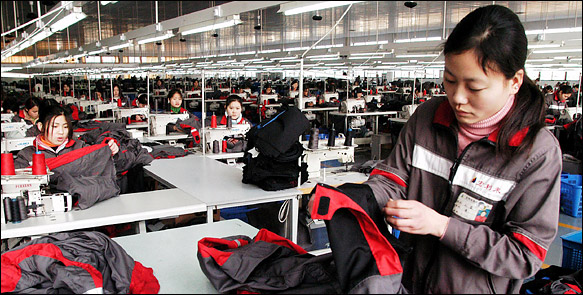The next in my short series on the ABC of Feminism focuses on gender and economic inequality by chair of Green Party Women Natalie Bennett. She's taken the ABC thing a bit more literally than the first two pieces - but it's all good! The A (introduction) of "women and economics" is simple and stark: men own nearly everything, women can be certainly of very little, or to put it in statistical terms, only about 1% of the world's assets are held by women. And only about 1% of the world's women have access to land - the basic foundation of survival, while 70% of the world's people living in abject poverty, on less than $1 a day, are female.
The A (introduction) of "women and economics" is simple and stark: men own nearly everything, women can be certainly of very little, or to put it in statistical terms, only about 1% of the world's assets are held by women. And only about 1% of the world's women have access to land - the basic foundation of survival, while 70% of the world's people living in abject poverty, on less than $1 a day, are female.
And it's not because women are lolling around, choosing the easy life. To quote The World's Women: 2010 (PDF) (a great statistical source): "In all regions, women spend at least twice as much time as men on unpaid domestic work" and "when unpaid work is taken into account, women’s total work hours are longer than men’s in all regions".
So what of the B, before? Well it's not the sort of thing that was being recorded in many parts of the world until very recently, but where there are records, we know that the situation today has dramatically improved compared to the past. In Britain, it was the Married Women's Property Act of 1882 that allowed married women to own anything much more than the clothes they stood up in. It's a right (at least with regard to land) that women in, to take just one example, Swaziland, are still struggling towards.
Why? Well that's the $24,000 question I'd be answering definitively if only I could lay my hands on some cash. Many theorists posit some past golden age - a Paleolithic heaven of equality (yet modern studies suggest current such societies show a wide range of models for the sexual division of labour and status), shading into darker shadows of Neolithic child-rearing and farm work. Yet others see a worship of "Mother Earth" and mother goddess in the Neolithic, with repression arising only with more complex, and hierarchical societies. A common everyday answer is that men are simply stronger than women, so in a world "naked in tooth and claw", they naturally come out with most of the goodies. As an answer to that read The Frailty Myth by Colette Dowling - the difference in at least potential power between men and women's bodies is minuscule.
A common everyday answer is that men are simply stronger than women, so in a world "naked in tooth and claw", they naturally come out with most of the goodies. As an answer to that read The Frailty Myth by Colette Dowling - the difference in at least potential power between men and women's bodies is minuscule.
Political and social power, however, are clearly a different issue. overwhelmingly in most of history they have been in the hands of men. why? Well the socialist/Marxist feminists will blame economic base, the radical feminists will blame patriarchy: I'm not going there today.
So what about C, change?
Clearly in the past century, women have made considerable advances in economic sphere. I was recently re-reading The Female Eunuch, and I was amazed to learn that up to the 1970s single women were regarded as a bad bet as rental tenants, their income simply was not seen as reliable. But as capitalism came to need the labour of educated middle-class women in particular, a space, and real economic opportunities became available for some.
But I'm reminded of the words of Sheila Rowbotham on her recent book tour, that in the 1970s she thought that victories once won were history, but now she understood this was only the start, and battles needed to be fought again and again.
To come close to home, just look at what's happening in the UK now with the government's savage cuts. Women, particularly poorer women, are going to suffer hugely disproportionately. As the Women's Budget Group's excellent report (PDF) outlines, lone parents are the single group worst hit in the budget and they’re overwhelmingly women (1,326,000 women to 130,000 men). The next worst-hit group are single pensioners – of whom 73% are women, who tend to be older and already poorer than male single pensioners.
But poverty, of course doesn't just relate to money. Remember those working-hour figures? The other side of the coalition's plans is the "Big Society". The state is going to step away from many services that it's now providing, and leave the community to pick up the slack. Already time-poor women are going to be asked to do more, a lot more.
Support for services such as childcare is being withdrawn. So remember Sheila Rowbotham: you don't just have to fight to win something, you have to fight to keep it too. Even if you personally have been lucky enough to have economic opportunities, there's no guarantee they're available in the future, for you, or future generations of women.
Wednesday, January 05, 2011
ABC of Feminism: women and economics
Labels: ABC of Feminism, Economics, Gender, Guest Post
Subscribe to:
Post Comments (Atom)

2 comments:
ı love woman man they are too polite but they are feminist
ı hate the people do racisim about somethıng fulloyun,psikopat senaryolar oyunu,yarış,ice tower oyunu,1 milyon canlı para,yüzüklerin efendisi oyunu
samanyolu hayvan belgeselleri,Beyaz Güvercinler İlahi Dinle,Unutkanlık,ravza ilahisi,ömer döngeloğlu hatim duası
Post a Comment